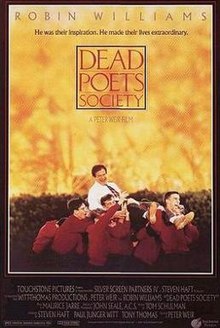Though contrived and sentimental in its idealism, Dead Poets Society touched the hearts of many young viewers, considering the critical and commercial success of the film, a period paean, a valentine to intellectually inclined teachers and their students.
While it may not be Weir’s best film artistically (my vote goes to Picnic at Hanging Rock), it is certainly his most commercial one, earning close to $236 million at the box office, against a modest budget of 14 million. (see below).
Grade: B+ (**** out of *****)
| Dead Poets Society | |
|---|---|

Theatrical release poster
|
|
Robin Williams plays John Keating, a charismatic, ultra-dedicated English teacher at a staid Vermont prep school circa 1959, whose infectious love of poetry, and insistence that each boy gets individual treatment and develops his unique skills, inspires his impressionable students.
Going against the grain, the place’s rigid rules and stern education methods as defined by headmaster Nolan (Norman Lloyd), Keating ignores conventionality and opens a whole new literary and cultural world to his students, one with the potentiality of changing their outlook and even their lives.
Under the disciplined direction of Peter Weir, Williams gives a restrained performance (at least by his own standards), and the film boasts many young actors, such as Ethan Hawke and Robert Sean Leonard, who would assume greater role in the American cinema of the 1990s.
The film depicts teaching as a one-sided interaction, which is erroneous for we never get a sense of what teaching gives back to Keating—or what kind of man he is outside of school.
The most tragic student is Neil, who becomes devastated after his father discovers his involvement in the play and demands he quit. He goes to Keating, who advises him to stand his ground and prove to his father that his love of acting is serious. Neil’s father shows up at the performance and angrily takes him home; he withdraws him from Welton and enrolls in a military academy. Lacking any support from his mother, a distraught Neil commits suicide.
Cameron blames Neil’s death on Keating to escape punishment for his own participation in the Dead Poets Society, and names the other members. Confronted by Charlie, Cameron urges the rest to let Keating take the fall. Each boy is called to Nolan’s office to sign a letter attesting to Cameron’s allegations, even knowing they are false. Todd is reluctant to sign, but does so after seeing that the others have complied.
In the last sequence, Keating is fired and Nolan takes over teaching the class, adhering to traditional Welton rules. As Keating leaves, Todd reveals that the boys were intimidated into signing the letter. Nolan threatens to expel Todd and anyone else who speaks out of line.
Last Sequence: Spoiler Alert
The rebellious Todd stands up on his desk and states the words “O Captain! My Captain!” Other members of the Dead Poets Society (except for Cameron), do the same, to Nolan’s fury and Keating’s pleasant surprise. Touched by their support, Keating proudly thanks the boys and departs as Todd looks on.
Like most Hollywood films, “Dead Poets Society” sides with its rebellious teacher and students and describes their parents in a rather negative and one-dimensional way.
This anomalous picture was extremely well-marketed by the studio as a prestige item, which might explain its status within the industry. The movie received four Oscar nominations, winning the Original Screenplay Award over tough competition from the scenarios of such indie hits as Spike Lee’s “Do the Right Thing” and Soderbergh’s Sundance smash, “sex, lies and videotape,” both of which were more controversial.
Indeed, as scripted by Tom Schulman, “Dead Poets Society” is enjoyable fare, the kind of which always appeals to the old, conservative Academy members. That it embraces the “right” values (passion, love for poetry, idealism) and glorifies teachers was also a plus, sending the right message at a time when education in the U.S. has severely declined.
The critic David Denby dismissed the film as an exploitation of teenage self-pity under a guise of being a celebration of creativity, and there is support for his charge.
See for yourself an emotional work that sharply divided film critics.
Cast
John Keating (Robin Williams)
Neil Perry (Robert Sean Leonard)
Todd Anderson (Ethan Hawke)
Knox Overstreet (Josh Street)
Charlie Dalton (Gale Hansen)
Richard Cameron (Dylan Kussman)
Steven Meeks (Allelon Ruggiero)
Gerard Pitts (James Patterson)
Mr. Nolan (Norman Lloyd)
Mr. Perry (Kurtwood Smith)
Oscar Nominations: 4
Picture, produced by Steven Haft, Paul Junger Witt, and Tony Thomas
Screenplay (Original): Tom Schulman
Director: Peter Weir
Actor: Robin Williams
Oscar Awards: 1
Screenplay
Oscar Context:
The most nominated film in 1989, the middling melodrama, Driving Miss Daisy received four Oscars out of its nine nominations, including Picture, Screenplay, and Actress. The biggest scandal was that the film’s director, Bruce Beresford, failed to receive recognition from his peers in the Directors Branch.
The other Best Picture nominees represented a mixed bag in genre and quality: Oliver Stone’s Vietnam drama “Born on the Fourth of July” with 8 nominations, “My Left Foot” with 5, “Dead Poets Society” with 4, and “Field of Dreams” with 3.
Daniel Day-Lewis deservedly won the Best Actor Oscar for “My Left Foot,” and Oliver Stone won Best Director for the Vietnam War drama, “Born on the Fourth of July.”
Credits:
Directed by Peter Weir
Written by Tom Schulman
Produced by Steven Haft, Paul Junger Witt, Tony Thomas
Cinematography John Seale
Edited by William Anderson
Music by Maurice Jarre
Production companies: Touchstone Pictures, Silver Screen Partners IV
Distributed by Buena Vista Pictures Distribution
Release date: June 2, 1989
Running time: 128 minutes
Budget $16.4 million
Box office $235.9 million




